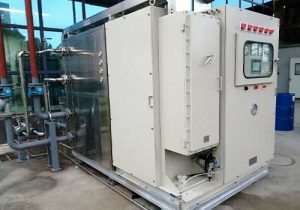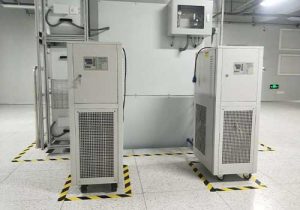industrial heat transfer
What Is Industrial Heat Transfer?
Industrial heat transfer is the process of moving thermal energy from one medium to another in manufacturing, chemical processing, power plants, and other industrial settings. Efficient heat transfer is crucial for maintaining optimal process temperatures, reducing energy consumption, and ensuring safety.

Heat Transfer Mechanisms in Industry
Conduction – Heat moves through solid materials (e.g., metal pipes, reactor walls). Common in heat exchangers and furnaces.
Convection – Heat transfer via fluid motion (liquids or gases). Used in boilers, cooling systems, and HVAC.
Radiation – Infrared energy transfer, important in high-temperature processes like metal smelting and glass manufacturing.
Common Industrial Heat Transfer Systems
Shell-and-Tube Heat Exchangers: Most widely used for high-pressure and high-temperature applications (e.g., oil refineries).

Plate Heat Exchangers: Compact and efficient for liquid-to-liquid heat exchange (e.g., food and beverage processing).
Finned-Tube Heat Exchangers: Enhance air-cooling efficiency in HVAC and refrigeration.
Boilers & Condensers: Generate steam for power plants and industrial heating.
Cooling Towers: Reject waste heat from industrial processes into the atmosphere.
Factors Affecting Industrial Heat Transfer Efficiency
Fluid Properties: Viscosity, specific heat, and thermal conductivity impact heat exchange rates.
Temperature Difference: Larger gradients drive faster heat transfer but may require more energy.
Flow Rate & Turbulence: Higher velocities improve convection but increase pumping costs.
Material Selection: Copper, aluminum, and stainless steel are chosen based on thermal and corrosion resistance.
Fouling & Scaling: Deposits on heat transfer surfaces reduce efficiency, requiring regular maintenance.
Key Industrial Applications
Oil & Gas: Heat exchangers preheat crude oil and cool refined products.

Chemical Processing: Reactors and distillation columns rely on precise temperature control.
Food & Beverage: Pasteurization, sterilization, and drying processes use heat exchangers.
Power Generation: Boilers and condensers convert thermal energy into electricity.
Pharmaceuticals: Temperature-sensitive reactions require controlled heat transfer.
Optimization Techniques
Advanced Materials: Ceramic coatings and high-performance alloys improve durability and conductivity.
Enhanced Surface Designs: Finned, corrugated, or microchannel surfaces increase heat transfer area.
Smart Control Systems: Automated temperature and flow regulation optimize energy use.
Predictive Maintenance: Sensors and AI detect fouling or inefficiencies before they impact performance.
Conclusion
Industrial heat transfer is essential for energy efficiency, process safety, and cost reduction across multiple industries. By selecting the right heat transfer systems, optimizing operating conditions, and maintaining equipment, industries can achieve superior thermal management and sustainability. Future advancements in materials and automation will further enhance heat transfer efficiency in industrial applications.
Related recommendations
Selection Factors for Industrial Refrigeration and Heating Equipment
1159Selection Factors for Industrial Refrigeration and Heating Equipment Refrigeration heating equipment is widely used in many fields. It can provide the functions of advance, repeatability and...
View detailsliquid chiller unit
691Introduction to Liquid Chiller Units Liquid chiller units are an essential part of industrial cooling systems, designed to circulate a coolant through a heat exchanger to provide precise temper...
View detailswater cooled heat pump chiller
577Water-Cooled Heat Pump Chiller: Efficiency and Sustainability in HVAC Systems Introduction to Water-Cooled Heat Pump Chiller Systems Water-cooled heat pump chillers are sophisticated sys...
View detailsReasons why Industrial Chillers need to be Debugged
1443Reasons why Industrial Chillers need to be Debugged Industrial chiller is a kind of water cooling equipment that can provide constant temperature, constant pressure and constant flow. The pri...
View details
 LNEYA Chiller
LNEYA Chiller







HelloPlease log in